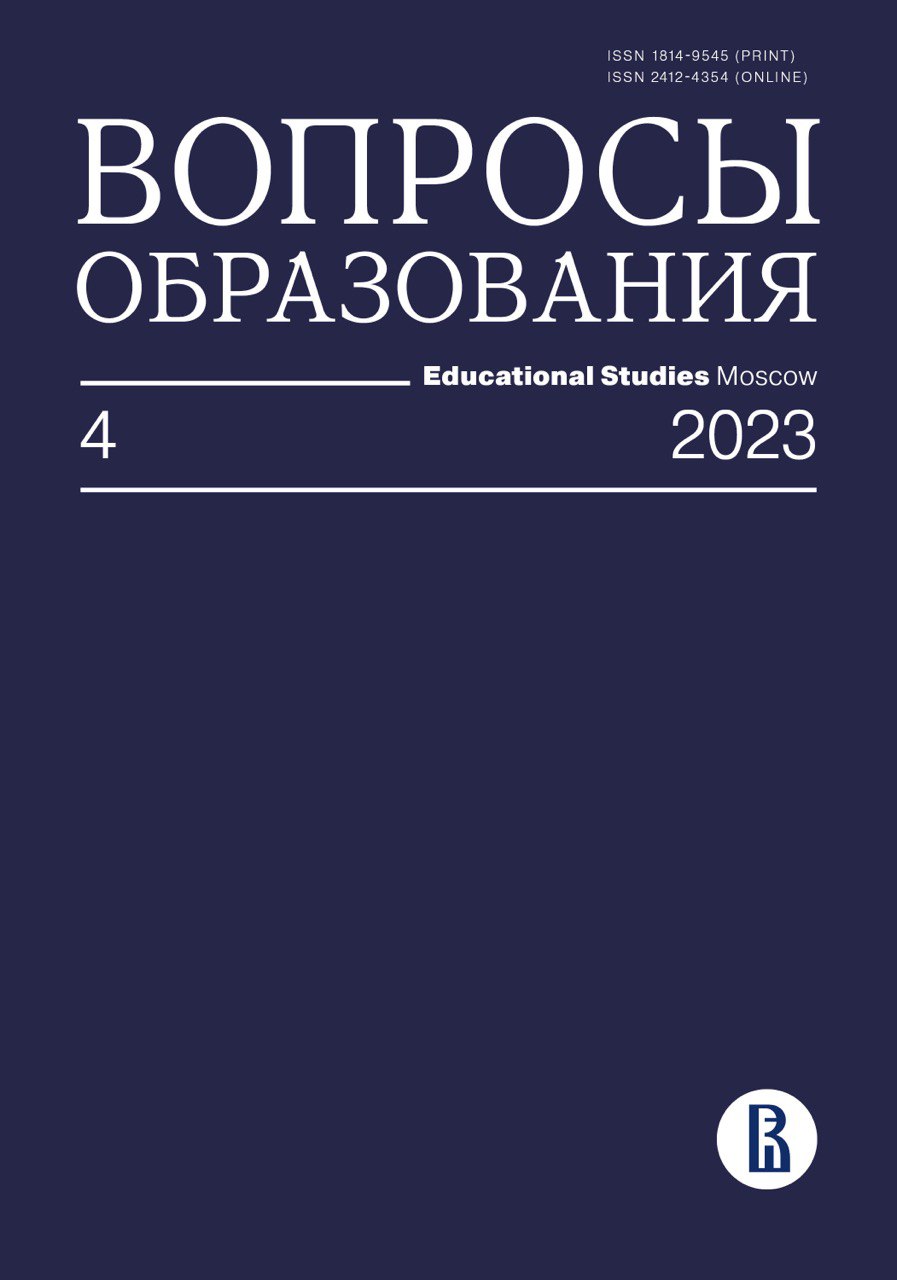Просветительские мероприятия по вакцинопрофилактике COVID-19: эффективны ли они?
Аннотация
В статье представлены результаты эксперимента по верификации программы просветительских мероприятий в области вакцинопрофилактики COVID-19 для студентов. Исследование проведено в Московском государственном психолого-педагогическом университете, аналитическую выборку составили 780 человек. Выделены пять аспектов отношения к вакцинации от COVID-19 и сформированы соответствующие им измерительные шкалы: польза вакцинации от коронавируса для человека и общества; отрицание опасности коронавируса и надежда на естественный иммунитет; страх перед побочными эффектами вакцинации от коронавируса и недоверие к информации о безопасности вакцинирования; уверенность в серьезных негативных последствиях вакцины от коронавируса; неверие в доказанность эффективности российских вакцин на международном уровне. Проведен сравнительный анализ эффективности четырех стратегий воздействия на отношение студентов к вакцинации от COVID-19: только лекции, лекции в сочетании с семинарами/вебинарами в традиционном формате, лекции в сочетании с разбором кейсов из жизни студентов, лекции в сочетании с проведением студенческих дебатов.
Принципиально лучшую стратегию воспитательного воздействия выделить не удалось. Эффективность лекций в сочетании с разного рода семинарскими занятиями несколько выше по сравнению с только лекциями, однако она в любом случае невелика. Стандартные размеры эффекта d Коэна не превышают 0,44. Студенческие дебаты наряду с лекциями как просветительская стратегия себя не оправдали. Выявлен ряд значимых корреляций различных аспектов отношения к вакцинации с естественнонаучной грамотностью, логическим мышлением, вербальным интеллектом, степенью переживания страха перед COVID-19, личностной и ситуационной тревожностью. Все корреляции слабые, но их направление соответствует ожидаемому.
Скачивания
Литература
Belova S.S., Valueva E.A. (2008) Problemy kul'turnoy relevantnosti otsenki intellekta i kreativnosti [Problems of Cultural Relevance of the Assessment of Intelligence and Creativity]. Proceedings of the Final Scientific Session of the PI RAS (Moscow, 2008, 14–15 February), Moscow: PI RAS, pp. 49–63.
Betsch C., Schmid P., Heinemeier D., Korn L., Holtmann C., Böhm R. (2018) Beyond Confidence: Development of a Measure Assessing the 5C Psychological Antecedents of Vaccination. PLoS One, vol. 13, no 12, Article no e0208601 https://doi.org/10.1371/journal.pone.0208601
Bors D., Stokes T.L. (1998) Raven's Advanced Progressive Matrices: Norms for First-Year University Students and the Development of a Short Form. Educational and Psychological Measurement, vol. 58, no 3, pp. 382–398. https://doi.org/10.1177/0013164498058003002
Dubé E., MacDonald N.E. (2022) COVID-19 Vaccine Hesitancy. Nature Review Nephrology, vol. 18, July, pp. 409–410. https://doi.org/10.1038/s41581-022-00571-2
Fieselmann J., Annac K., Erdsiek F., Yilmaz-Aslan Y., Brzoska P. (2022) What Are the Reasons for Refusing a COVID-19 Vaccine? A Qualitative Analysis of Social Media in Germany. BMC Public Health, vol. 22, Article no 846. https://doi.org/10.1186/s12889-022-13265-y
Figueiredo de A., Simas C., Karafillakis E., Paterson P., Larson H.J. (2020) Mapping Global Trends in Vaccine Confidence and Investigating Barriers to Vaccine Uptake: A Large-Scale Retrospective Temporal Modelling Study. Lancet, vol. 396, September, pp. 898–908. https://doi.org/10.1016/S0140-6736(20)31558-0
Gormally C., Brickman P., Lutz M. (2012) Developing a Test of Scientific Literacy Skills (TOSLS): Measuring Undergraduates' Evaluation of Scientific Information and Arguments. CBE-Life Sciences Education, vol. 11, no 4, pp. 364–377. https://doi.org/10.1187/cbe.12-03-0026
Halstead I.N., McKay R.T., Lewis G.J. (2022) COVID-19 and Seasonal Flu Vaccination Hesitancy: Links to Personality and General Intelligence in a Large, UK Cohort. Vaccine, vol. 40, no 32, pp. 4488–4495. https://doi.org/10.1016/j.vaccine.2022.05.062
James E.K., Bokemper S.E., Gerber A.S., Omer S.B., Huber G.A. (2021) Persuasive Messaging to Increase COVID-19 Vaccine Uptake Intentions. Vaccine, vol. 39, iss. 49, pp. 7158–7165. https://doi.org/10.1016/j.vaccine.2021.10.039
Krushelnitskaya O.B., Marinova T.Y., Pogodina A.V., Raskhodchikova M.N., Tolstykh N.N. (2021) Normativnoe povedenie v situatsii pandemii COVID-19: kak dobit´sya ego soblyudeniya u studentov? [Regulatory Behavior in the COVID-19 Pandemic: How to Get Students to Comply with It?]. Sotsial'naya psikhologiya i obshchestvo / Social Psychology and Society, vol. 12, no 1, pp. 198–221. https://doi.org/10.17759/sps.2021120113
Lazarus J.V., Ratzan S.C., Palayew A., Gostin L.O., Larson H.C. J., Rabin K., El-Mohandes A. (2021) A Global Survey of Potential Acceptance of a COVID-19 Vaccine. Nature Medicine, vol. 27, no 2, pp. 225–228. https://doi.org/10.1038/s41591-020-1124-9
MacDonald N.E. (2015) SAGE Working Group on Vaccine Hesitancy. Vaccine Hesitancy: Definition, Scope and Determinants. Vaccine, vol. 33, no 34, pp. 4161–4164. https://doi.org/10.1016/j.vaccine.2015.04.036
Machingaidze S., Wiysonge C.S. (2021) Understanding COVID-19 Vaccine Hesitancy. Nature Medicine, vol. 27, no 8, pp. 1338–1339. https://doi.org/10.1038/s41591-021-01459-7
Margolis A.A. (2021) Novaya nauchnaya gramotnost´: problemy i trudnosti formirovaniya [New Science Literacy: Problems and Difficulties of Formation]. Psikhologicheskaya nauka i obrazovanie / Psychological Science and Education, vol. 26, no 6, pp. 5–24. https://doi.org/10.17759/pse.2021260601
Margolis A.A., Sorokova M.G., Shepeleva E.A., Raskhodchikova M.N., Shvedovskaya A.A., Radchikova N.P. (2023) Dokazatel'ny podkhod: verifikatsiya programmy prosvetitel'skikh meropriyatiy v oblasti vaktsinoprofilaktiki COVID-19 [Evidence Based Approach: Verifying the COVID-19 Vaccination Educational Program], 2022. Dataset. https://doi.org/10.48612/MSUPE/fbu1-pnhb-9dbn
Margolis A.A., Sorokova M.G., Shvedovskaya A.A., Radchikova N.P. (2022) Razrabotka i standartizatsiya oprosnika "Shkala otnosheniya k vaktsinatsii ot COVID-19" [The Questionnaire "COVID-19 Vaccine Attitude Scale" (COVID-19 VAS): Development and Standardization]. Psychology. Journal of Higher School of Economics, vol. 19, no 3, pp. 454-474 (in Russian) DOI: https://doi.org/10.17323/1813-8918-2022-3-454-474
Murphy J., Vallières F., Bentall R.P., Shevlin M., McBride O., Hartman T.K. et al. (2021) Psychological Characteristics Associated with COVID-19 Vaccine Hesitancy and Resistance in Ireland and the United Kingdom. Nature Communications, vol. 12, Article no 29. https://doi.org/10.1038/s41467-020-20226-9
Nemunaitis J., Lehmann P.V., Willey J. (2022) Pros and Cons for COVID-19 Vaccination and Boost of Young Adults in Light of Recent Literature. Medical Research Archives, vol. 10, no 8. https://doi.org/10.18103/mra.v10i8.2943
Rahman M.A., Islam M.S. (2021) Early Approval of COVID-19 Vaccines: Pros and Cons. Human Vaccines & Immunotherapeutics, vol. 17, no 10, pp. 3288–3296. https://doi.org/10.1080/21645515.2021.1944742
Ryaguzova E.V. (2021) Kognitivnye aspekty otnosheniya studencheskoy molodezhi k vaktsinatsii ot COVID-19 [Cognitive Aspects of Students' Attitudes Towards COVID-19 Vaccination]. Russian Psychological Journal, vol. 18, no 2, pp. 109–121. https://doi.org/10.21702/rpj.2021.2.7
Sawicki A.J., Żemojtel-Piotrowska M., Balcerowska J.M., Sawicka M.J., Piotrowski J., Sedikides C. et al., (2022) The Fear of COVID-19 Scale: Its Structure and Measurement Invariance across 48 Countries. Psychological Assessment, vol. 34, no 3, pp. 294–310. https://doi.org/10.1037/pas0001102
Spielberger C., Sydeman S. (1994) State-Trait Anxiety Inventory and State-Trait Anger Expression Inventory. The Use of Psychological Testing for Treatment Planning and Outcome Assessment (ed. M.E. Maruish), Hillsdale, NJ: Lawrence Erlbaum Associates, pp. 292–321. http://dx.doi.org/10.1002/9780470479216.corpsy0943
Troiano G., Nardi A. (2021) Vaccine Hesitancy in the Era of COVID-19. Public Health, vol. 194, no 2, pp. 245–251. https://doi.org/10.1016/j.puhe.2021.02.025








